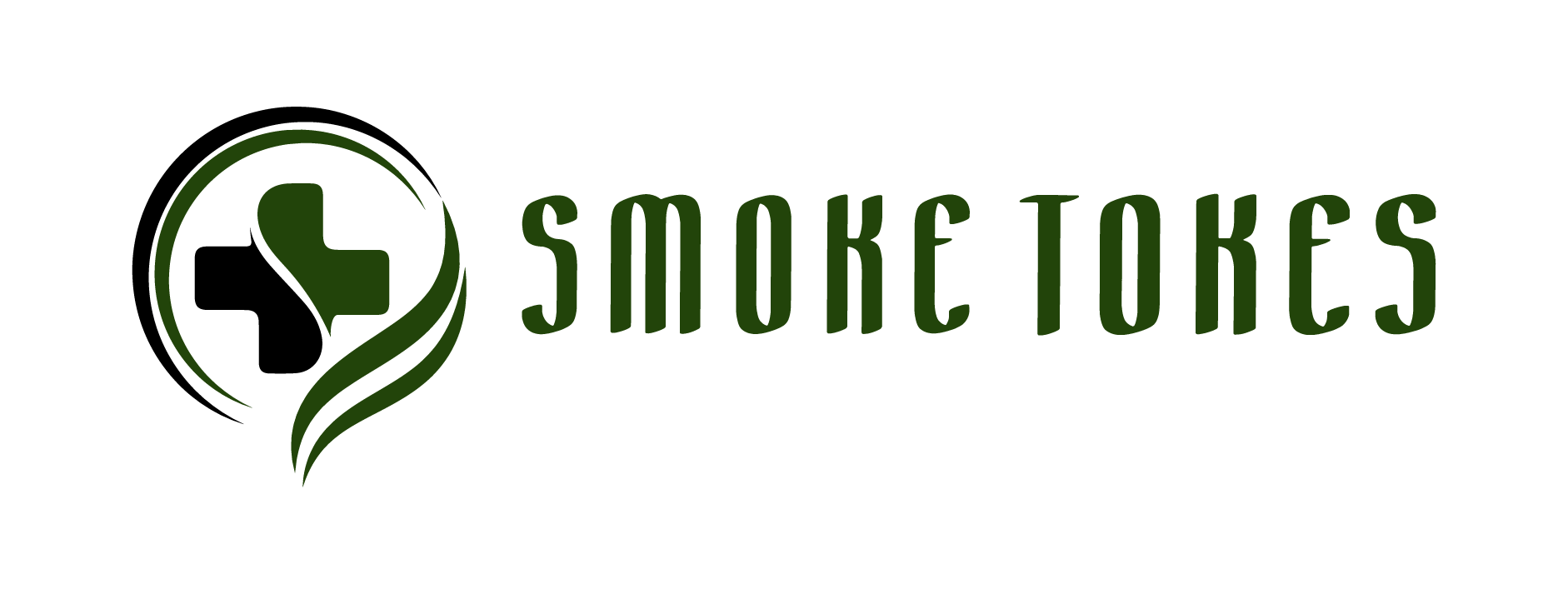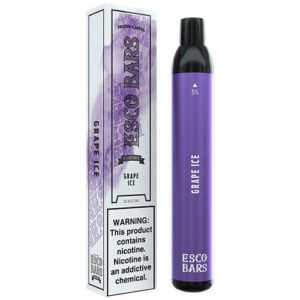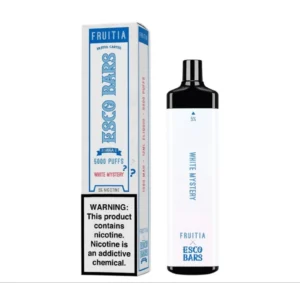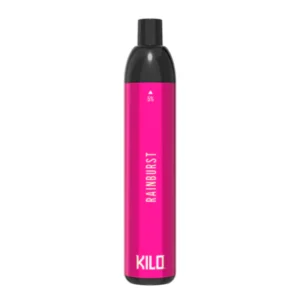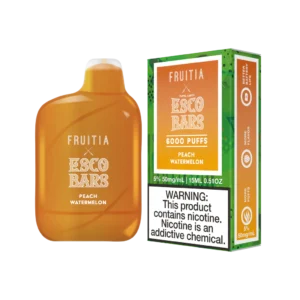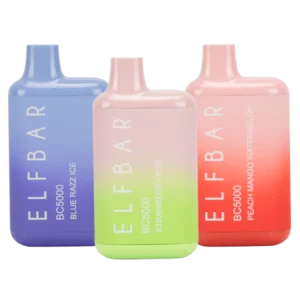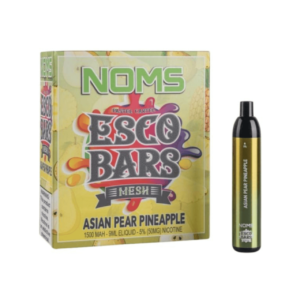
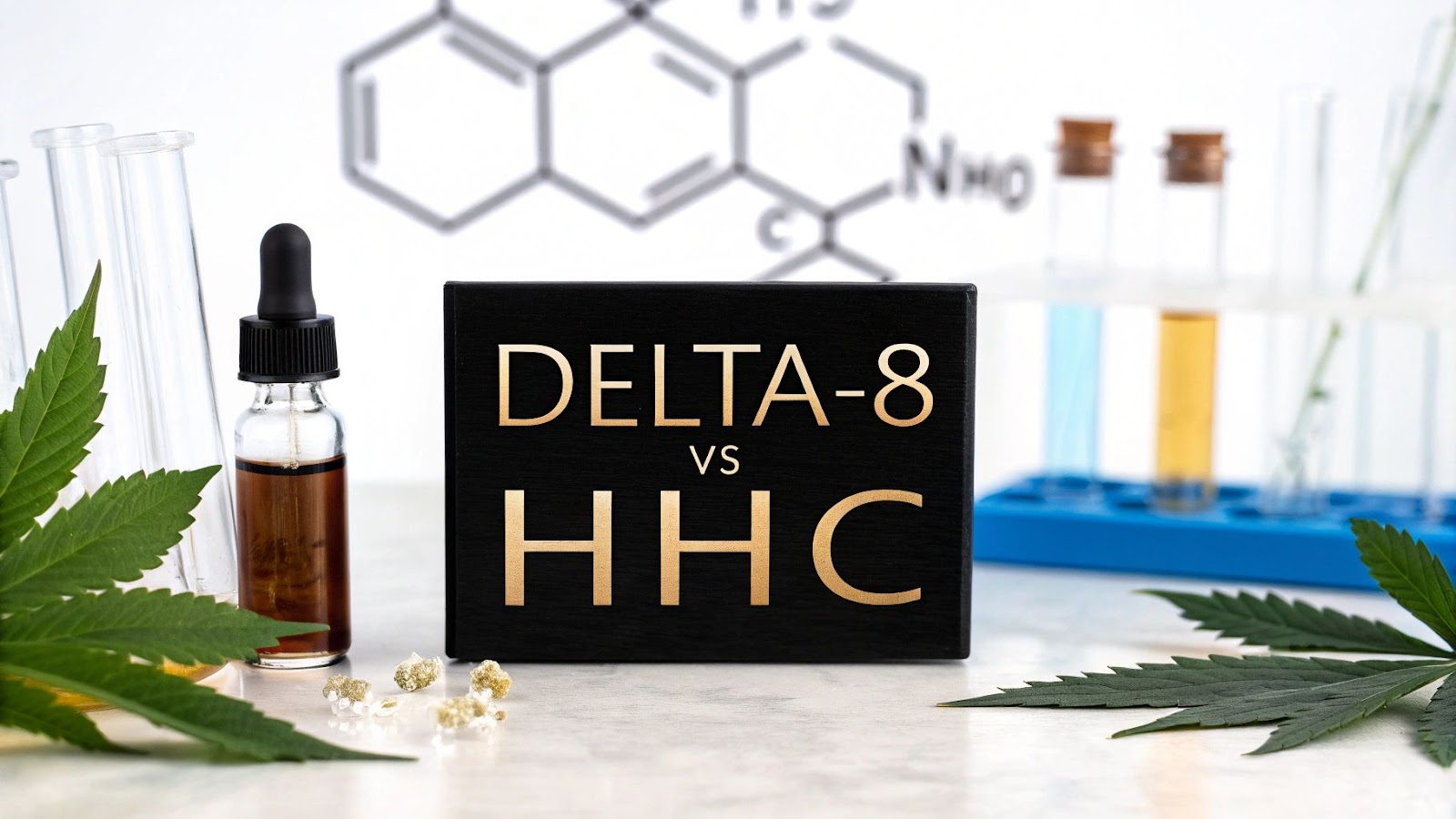
Delta 8 vs HHC: A Practical Cannabinoid Guide
When you’re deciding between Delta 8 vs. HHC, it really boils down to the kind of experience you’re after. Think of it like this: Delta-8 THC is your go-to for a milder, more relaxing vibe, a smooth and predictable current of calm. In contrast, HHC is known for being more stable and often delivering a brighter, more energetic lift.
Your choice hinges on what you value more—a gentle, clear-headed buzz or a more durable, potentially uplifting alternative.
Understanding Modern Hemp Cannabinoids
The world of hemp-derived cannabinoids is expanding at a dizzying pace, with innovative new compounds constantly emerging. This guide is designed to give you a straight-up, balanced comparison between two of the most popular players: Delta-8 THC and HHC.
Though both are legal under the federal Farm Bill, they deliver distinctly different effects. We’ll get into everything from their chemical makeup to how they feel in the real world, giving you the context needed to figure out which one fits your goals. Consider this your roadmap to making a smart, confident choice.
A Quick Look at the Contenders
Before we dive into the nitty-gritty, here’s a high-level snapshot of what makes these two cannabinoids unique.
| Feature | Delta-8 THC | HHC (Hexahydrocannabinol) |
| Typical Effects | Relaxing, clear-headed, mellow high | Uplifting, energetic, varies in potency |
| Potency | Milder than traditional Delta-9 THC | Often between Delta-8 and Delta-9 THC |
| Chemical Structure | A natural isomer of THC | A hydrogenated form of THC |
| Shelf Stability | Less stable; degrades with light/heat | Highly stable; long shelf life |
Market Presence and Popularity
While both Delta-8 and HHC come from hemp, their journeys in the market have been quite different. Delta-8 THC absolutely exploded after the 2018 Farm Bill passed, carving out a market worth around $2 billion in 2021 and 2022. People were drawn to it as a less intense, more accessible alternative to traditional THC. You can read more about the US Delta-8 market’s impressive growth to see the full picture.
HHC is the newer kid on the block but is gaining ground fast, especially in states where Delta-8 faces legal challenges. Of course, the convenience and innovation of how you consume these cannabinoids, like vaping, massively influence their popularity. If that’s a new area for you, our guide on CBD Vaping 101 is a great place to start.
Comparing Delta-8 and HHC: Key Differences
When you put Delta-8 and HHC side-by-side, their differences become much clearer than their shared hemp origins might suggest. It’s like comparing two songs from the same artist—they share a similar vibe but create entirely different moods. The real distinctions are rooted in their chemical structure, which has a ripple effect on everything from how long they last on the shelf to the actual experience they deliver.
The biggest structural difference is that HHC is a hydrogenated cannabinoid. Think of it like the process that turns vegetable oil into margarine—hydrogen atoms are added to the molecule. This small chemical tweak makes HHC incredibly stable, giving it a much longer shelf life and making it resistant to breaking down from heat and UV light. Delta-8, on the other hand, is a bit more fragile and can lose its kick over time if not stored properly.
Psychoactive Profile and Potency
For most people, the deciding factor comes down to how these two cannabinoids actually feel. The whole debate often boils down to the kind of high each one produces.
- Delta-8 THC: Almost everyone who tries it describes a mild, clear-headed, and relaxing high. It’s the go-to for people who find traditional Delta-9 THC a bit too intense, as it offers a gentle body buzz and mental calm without the anxiety or paranoia that can sometimes tag along.
- HHC (Hexahydrocannabinol): This one is a bit more of a wild card and is usually reported as being stronger than Delta-8. Many users feel HHC’s effects are more uplifting and energetic—almost like a sativa experience—while still being less intense than Delta-9 THC.
This infographic gives a solid visual rundown of what makes Delta-8 tick.
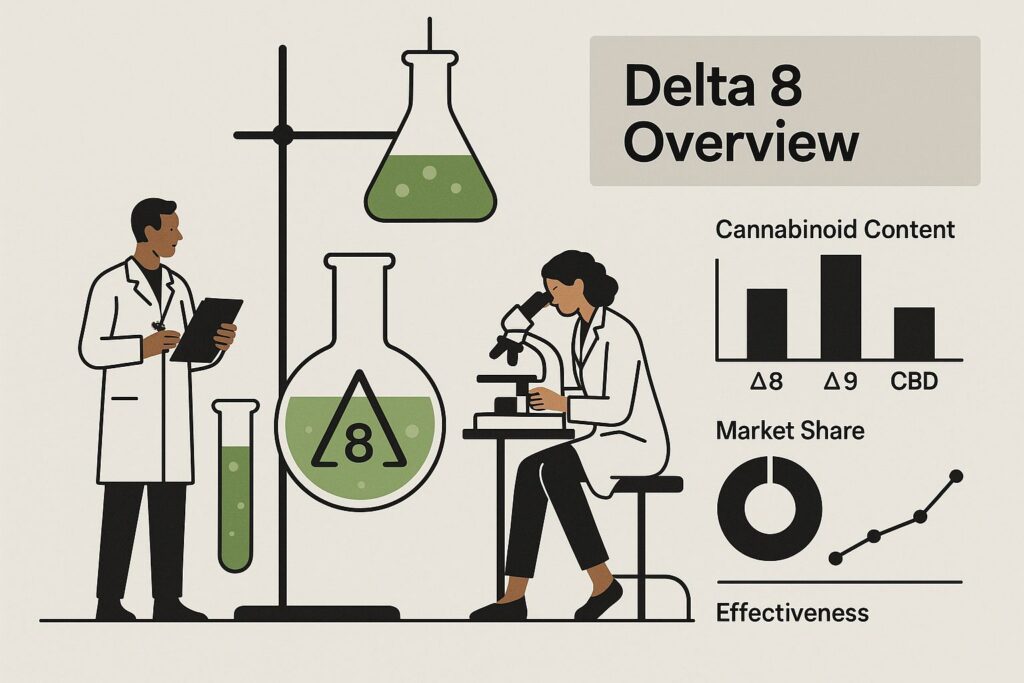
As you can see from the lab visual, knowing the core properties of each compound is the first step to figuring out how it will affect you.
One thing to keep in mind with HHC is that its potency can be inconsistent. That’s because when it’s made, the final product is a mix of two different HHC molecules: the psychoactive 9R HHC and the non-psychoactive 9S HHC. The ratio between these two determines the product’s overall strength, which is why experiences can vary more than with the predictable effects of Delta-8.
Delta-8 THC vs HHC At a Glance
To make this simple, here’s a quick breakdown of the core distinctions in a straightforward table. It’s a handy reference for the most important points when you’re weighing your options.
| Characteristic | Delta-8 THC | HHC (Hexahydrocannabinol) |
| Molecular Stability | Less stable; can degrade from heat and light. | Highly stable due to hydrogenation; has a much longer shelf life. |
| Psychoactive Feel | Generally calming, relaxing, and clear-headed. | Often more energetic and uplifting; effects can be more variable. |
| Reported Potency | Mild and consistent; roughly half as potent as Delta-9 THC. | Variable; usually stronger than Delta-8 but still milder than Delta-9. |
| Source | Occurs naturally in trace amounts in hemp; usually converted from CBD. | Semi-synthetic; created by hydrogenating a THC molecule in a lab. |
The key takeaway is this: Go with Delta-8 for predictable relaxation and a mellow experience. Opt for HHC if you’re after something a bit stronger with an uplifting feel and you value superior shelf stability.
Common Product Formats
Both cannabinoids have found their way into a huge variety of products, catering to virtually every preference. You can find both Delta-8 and HHC in popular forms, each offering a unique experience:
- Vape Cartridges: For fast-acting effects with rich, flavorful vapor.
- Gummies & Edibles: For a pre-measured dose and a delicious, longer-lasting experience.
- Tinctures: For sublingual use and precise, customizable dosing.
- Disposable Vapes: For ultimate convenience and portability when you’re on the go.
Because it’s so stable, HHC is a fantastic choice for products that might sit on a shelf for a while, like edibles and tinctures. If you’re curious about what’s out there, you can explore different types of Delta-8 products to see what might fit your lifestyle. This versatility means that whether you prefer the gentle calm of Delta-8 or the energetic buzz of HHC, there’s an innovative product out there for you.
The Subjective Experience: What to Expect
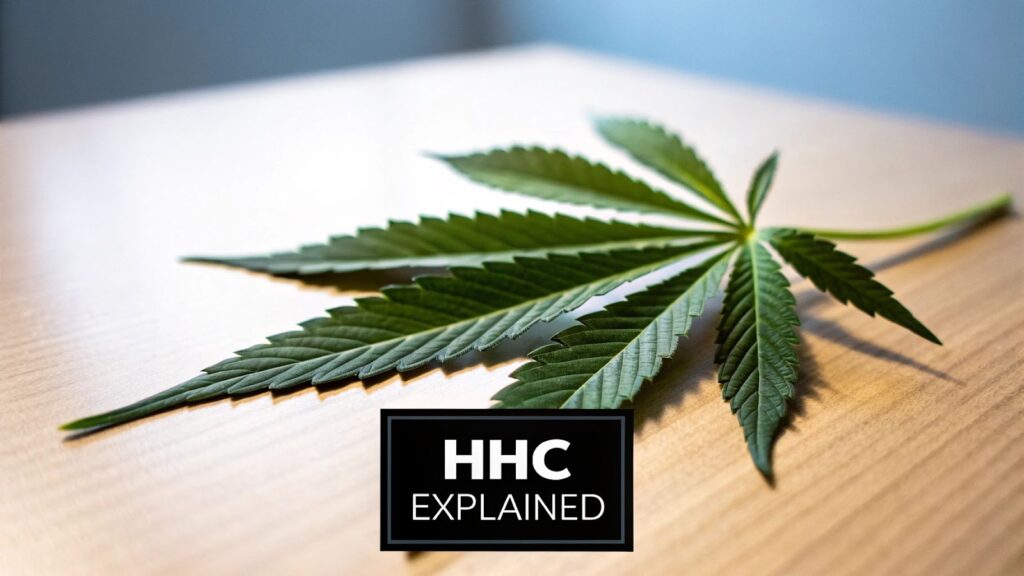
Forget the lab reports and chemical structures for a minute. When it comes to the delta 8 vs hhc question, what everyone really wants to know is simple: how does it actually feel? This is where the rubber meets the road, because the subjective experience is where you’ll find the biggest differences between the two.
Think of Delta-8 THC as your favorite well-worn hoodie. It’s reliable, comfortable, and predictable. People who use it often talk about a smooth, manageable high—a gentle wave of relaxation that calms the body and mind without the intense, racy head-buzz that can sometimes trigger anxiety with more potent cannabinoids.
That’s why Delta-8 has become a go-to for so many. It’s perfect for unwinding after a stressful day, settling into a creative groove, or just chilling with friends. You get a clear-headed lift that lets you stay present and functional.
Unpacking the Delta-8 Vibe
The feeling from Delta-8 is almost always described as more of a “body high” than a “head high.” It’s less about shifting your perception and more about settling into a state of deep calm.
- Gentle Euphoria: A light, happy feeling washes over you without ever feeling like you’re losing control.
- Physical Relaxation: That tension you hold in your shoulders and back? It just seems to melt away.
- Mental Clarity: You can still follow a conversation, get lost in a movie, or focus on a task without much trouble.
This consistency is Delta-8’s greatest strength. It’s the cannabinoid people reach for when they just want to take the edge off, not check out completely.
The real magic of Delta-8 is in its subtlety. It’s not about blasting off into another dimension; it’s about adding a layer of tranquility to your reality. This makes it a fantastic starting point for beginners and a reliable staple for experienced folks looking for a milder ride.
Exploring the Enigma of HHC
So, if Delta-8 is that cozy hoodie, HHC is more like a versatile jacket. Its effects can shift depending on the person, the dose, and even the day. Most people find that HHC lands somewhere in the middle ground between the mellow calm of Delta-8 and the full-blown intensity of traditional Delta-9 THC.
For many, HHC brings on a more uplifting, sativa-like energy. It can spark creativity and make you feel more sociable, which is why some prefer it for daytime activities or brainstorming. The catch? Its effects aren’t always consistent from person to person.
HHC, or hexahydrocannabinol, is still a relative newcomer. What sets it apart from Delta-8 is its hydrogenated structure, which makes it much more stable. As a semi-synthetic cannabinoid, it has exploded in popularity, especially in places where Delta-8 faces restrictions, establishing itself as a key legal alternative by 2024.
Ultimately, how these compounds affect you comes down to your own body chemistry, tolerance, and dosage. The delivery method matters, too—vaping hits very differently than an edible, for example. To get a better handle on what to expect, you can separate fact from fiction by checking out our guide that busts common myths about CBD vaping.
Navigating the Complex Legal Landscape
When you’re trying to figure out the difference between delta 8 vs hhc, the legal side of things is where it gets really messy. The whole situation stems from the 2018 Farm Bill, which legalized hemp and its derivatives. That single act unintentionally kicked the door open for cannabinoids like Delta-8 and HHC to hit the market.
But that federal nod of approval was just the start.
States immediately started creating their own rules, leading to a confusing patchwork of laws. What’s perfectly legal in one state might be banned right across the border. It’s a constantly shifting landscape that can be incredibly tough to keep up with.
The Crackdown on Delta-8
Delta-8 THC exploded in popularity almost overnight. Of course, that kind of attention puts you right in the crosshairs of regulators. Many states got nervous about its psychoactive effects and the general lack of oversight, so they moved to restrict or ban it completely.
This means you could buy Delta-8 without a problem in one state, then face legal issues for just having it in the next. This regulatory whiplash makes it absolutely crucial to know your local laws—and to remember they could change at any moment.
HHC’s Legal Gray Area
This is where HHC often becomes the go-to alternative. Since it’s a newer cannabinoid, it tends to exist in a legal gray area, slipping past the specific language of laws that target “Delta-8 THC.” Its chemical structure is different enough that many of the bans simply don’t apply to it.
The key takeaway here is that HHC’s semi-synthetic creation and unique molecular structure often put it outside the specific legal definitions used to outlaw Delta-8. This has made it a popular choice for people living in states where Delta-8 is off-limits.
Looking at the big picture, both Delta-8 and HHC are caught in a tug-of-war between massive consumer demand and a legal system that’s struggling to catch up. In the US, about 52% of the population lives in states where Delta-8 is either legal or in a gray area, which has fueled a multibillion-dollar market since 2020. On the flip side, many states have banned it over safety concerns, pointing out that it’s an intoxicating substance without clear FDA approval. HHC is newer and less known, so it flies under the radar for now but is drawing more and more scrutiny. For a deeper dive into this dynamic, you can discover more insights on the medical marijuana market at metatechinsights.com.
At the end of the day, it’s on you—the consumer—to check the specific laws in your area before buying anything. The legal ground is always shifting, and what’s okay today might not be tomorrow. If you’re curious about how different cannabinoids are used in various products, you might find our guide on mastering the art of CBD e-liquid mixing insightful.
Prioritizing Safety and Responsible Use

Let’s be clear: when you’re exploring hemp-derived cannabinoids, safety has to be your top priority. The market for products like Delta-8 and HHC is largely unregulated at the federal level, which means the burden of due diligence falls squarely on your shoulders.
Your most powerful tool in this process is the Certificate of Analysis (CoA). Think of it as a product’s report card. This document, issued by an independent third-party lab, is non-negotiable.
A CoA gives you a transparent look at what’s actually in the product you’re about to consume. It confirms that the cannabinoid levels match what’s on the label and, more importantly, screens for unwanted contaminants—like pesticides, heavy metals, or leftover solvents from extraction.
Why Untested Products Are a Gamble
Buying a product without a lab report is a roll of the dice. You’re essentially trusting a company’s marketing claims with no proof, which can lead to some serious issues.
When you’re weighing delta 8 vs hhc, the safety profile confirmed by that CoA should be a major factor in your decision. Untested products might contain far less (or more) of the active cannabinoid than advertised, or even worse, harbor dangerous contaminants.
Here’s why it’s a dealbreaker:
- Purity: A clean CoA is your proof that the product is free from harmful chemicals.
- Potency: It guarantees you’re actually getting the amount of Delta-8 or HHC you paid for.
- Peace of Mind: There’s a certain confidence that comes from knowing your product has been professionally vetted.
In an industry where trust is everything, a Certificate of Analysis is the clearest sign that a brand is committed to quality and your well-being. If a company won’t show you their lab results, walk away.
Best Practices for Safe Consumption
Finding a tested product is step one. Step two is using it responsibly. Whether you land on the chill effects of Delta-8 or the clearer buzz of HHC, how you consume it is just as important as what you’re consuming.
The golden rule, especially if you’re a beginner or trying something new, is to start low and go slow. This is absolutely critical with edibles, which can take an hour or more to fully kick in. Take a small dose, then wait and see how you feel before even thinking about taking more. It’s the only way to find your sweet spot without overdoing it.
It’s also smart to know how your gear works. If you’re vaping, for instance, a little knowledge goes a long way, which is why we put together a guide on how to vape safely.
Finally, before you add any new cannabinoid to your routine, it’s always a good idea to consult a healthcare professional. This is particularly true if you have any underlying health conditions or take other medications. They can offer personalized advice that a website never could.
So, Which One Should You Choose?
Deciding between Delta-8 and HHC isn’t about finding a single “best” option. It’s really about figuring out what you want from the experience. Think of it less as a contest and more like picking the right gear for the job, based on your own tolerance, local laws, and what you’re hoping to feel.
Everything we’ve discussed—from how they’re made to how they feel—is meant to give you the confidence to make that call. By getting a handle on the unique personalities of Delta-8 and HHC, you can pick the one that truly fits your goals.
For Those Who Prefer a Mellow Vibe
If you’re just dipping your toes into the world of psychoactive cannabinoids or simply want something gentle and predictable, Delta-8 THC is almost always the best place to start. It’s well-known for offering a mild, clear-headed high that helps you unwind without feeling overwhelmed.
Delta-8 is probably your best bet if you:
- Are new to psychoactive cannabinoids and want to ease in.
- Need a reliable way to take the edge off and manage everyday stress.
- Live somewhere that has given Delta-8 the clear legal green light.
- Are looking for a relaxing body sensation more than a powerful mental buzz.
People often describe its effects as calming and easy to manage. That makes it perfect for a quiet evening when you want to focus or for a chill social hangout where you still want to be part of the conversation.
For the Seasoned Explorer
Now, if you’ve been around the block a few times or if legal restrictions on Delta-8 have you looking for alternatives, HHC might be right up your alley. Users often say its effects are more energetic and uplifting, landing in a sweet spot between the laid-back feel of Delta-8 and the full-throttle intensity of Delta-9 THC.
HHC could be the one for you if you:
- Live in a state where Delta-8 is banned or heavily restricted.
- Are an experienced user looking for something with a bit more punch.
- Enjoy a more sativa-like, cerebral feeling for creative projects or social outings.
- Appreciate a product that lasts longer on the shelf, thanks to its rock-solid chemical structure.
Here’s the bottom line: your situation is what matters most. Where you live, how much experience you have, and the kind of effect you’re chasing should be the deciding factors.
Ultimately, the best way to feel confident in your choice is to talk it over with someone who really knows these products. Our team can give you personalized recommendations based on what you’re looking for.
At Smoke Tokes CBD and Vape Shops, we’re here to help you sort through your options and find exactly what you need. Come visit us at one of our locations in San Antonio, Schertz, or Austin to check out our hand-picked selection and get some expert advice from our crew.
Nicotine is an addictive chemical. Content intended for adults 21+.
